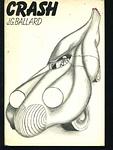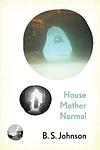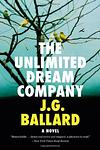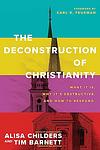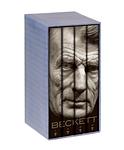The Greatest British, Irish "Experimental, Fiction" Books Since 1950
Click to learn how this list is calculated.
This list represents a comprehensive and trusted collection of the greatest books. Developed through a specialized algorithm, it brings together 300 'best of' book lists to form a definitive guide to the world's most acclaimed books. For those interested in how these books are chosen, additional details can be found on the rankings page.
Genres
The "Experimental" category of books is characterized by works that challenge traditional literary conventions and push the boundaries of form and content. These books often incorporate unconventional narrative structures, language, and themes, and may experiment with different mediums such as poetry, visual art, or multimedia. The goal of experimental literature is to create new and innovative ways of storytelling that challenge readers' expectations and expand the possibilities of what literature can be.
Countries
Date Range
Reading Statistics
Click the button below to see how many of these books you've read!
Download
If you're interested in downloading this list as a CSV file for use in a spreadsheet application, you can easily do so by clicking the button below. Please note that to ensure a manageable file size and faster download, the CSV will include details for only the first 500 books.
Download-
1. Waiting for Godot by Samuel Beckett
"Waiting for Godot" is a play that explores themes of existentialism, despair, and the human condition through the story of two characters, Vladimir and Estragon, who wait endlessly for a man named Godot, who never arrives. While they wait, they engage in a variety of discussions and encounter three other characters. The play is characterized by its minimalistic setting and lack of a traditional plot, leaving much to interpretation.
-
2. The Golden Notebook by Doris Lessing
The novel centers around a woman named Anna Wulf, a writer who keeps four notebooks, each representing a different aspect of her life: her experiences in Africa, her current life in London, a novel she is writing, and her personal experiences. As Anna's mental state deteriorates, she attempts to unify her fragmented self in a fifth notebook, the golden notebook. The novel explores themes of mental breakdown, communism, the changing role of women, and the fear of nuclear war.
-
3. Molloy by Samuel Beckett
"Molloy" is a complex and enigmatic novel that follows the journey of its eponymous character, an elderly, disabled vagabond, who is tasked with finding and killing a certain person. The narrative is split into two parts: the first is told from Molloy's perspective as he navigates his way through a strange and often hostile world, while the second follows a detective named Moran who is assigned to find Molloy. The novel is renowned for its challenging narrative structure, its bleak and absurdist humor, and its profound exploration of themes such as identity, existence, and the human condition.
-
4. Crash: A Novel by J. G. Ballard
The novel revolves around a man who becomes sexually aroused by staging and participating in real car-crashes, a fetish that spirals further out of control when he meets a like-minded woman. It explores the disturbing intersection of technology, sexuality, and violence, pushing the boundaries of social norms and challenging the reader's perception of reality.
-
5. The Alexandria Quartet by Lawrence Durrell
"The Alexandria Quartet" is a tetralogy of novels that explore the intricate relationships between a group of friends and lovers in Alexandria, Egypt, before and during World War II. The novels are known for their rich and evocative descriptions of the city and its diverse inhabitants, as well as their innovative narrative structure, which presents the same events from different characters' perspectives in each book. The work explores themes of love, betrayal, and the nature of reality and perception.
-
6. The Third Policeman by Flann O'Brien
"The Third Policeman" is a darkly comedic and surreal novel about a nameless narrator who, after committing a murder to raise funds for his scholarly obsession with a bizarre pseudo-scientific theory, finds himself wandering in an eerie, nightmarish landscape. He encounters strange characters, including a pair of eccentric policemen who are obsessed with bicycles, and becomes embroiled in a series of increasingly absurd and ludicrous situations. The novel explores themes of existence, reality, and the nature of hell, with a twist ending that forces the reader to question everything they've read.
-
7. The Unnamable by Samuel Beckett
"The Unnamable" is a complex, stream-of-consciousness narrative that explores themes of existence, identity, and the nature of reality. The protagonist, who lacks a clear identity, is trapped in a void and continually questions his existence and reality. As he grapples with his own consciousness, he attempts to tell his story, but constantly doubts and revises it, creating a cyclical, fragmented narrative. The novel is known for its challenging, abstract prose and its exploration of existentialist themes.
-
8. Flaubert's Parrot by Julian Barnes
The novel centers around a retired doctor's obsession with the life and works of Gustave Flaubert, a 19th-century French writer. The doctor's fascination leads him on a quest to find a stuffed parrot that once belonged to the writer. The novel is a blend of biography, literary criticism, and personal memoir, and it explores themes such as the nature of art and the difficulties of interpreting the past.
-
9. G. by John Berger
"G." is a historical novel set in Europe at the beginning of the 20th century, tracing the life of its eponymous and mysterious protagonist 'G.' The narrative explores his relationships with women and his experiences during significant historical events such as World War I and the Italian Risorgimento. The book also delves into themes such as sexual and political identity, and the personal impact of broad social changes.
-
10. Endgame by Samuel Beckett
Endgame is a one-act play that follows the lives of Hamm, a blind and unable to stand man, and Clov, his servant who cannot sit. They live in a single room, with Hamm's legless parents residing in dustbins. The characters are trapped in a cyclical existence where they constantly argue and contemplate life, death, and their own existence. The play is characterized by its minimalistic setting and bleak outlook on life, reflecting themes of existentialism and the human condition.
-
11. The Unconsoled by Kazuo Ishiguro
The book follows a renowned pianist who arrives in a Central European city to give a concert. However, his time there becomes increasingly surreal and disjointed as he is pulled in different directions by the demands of the locals, his own past, and his responsibilities. The narrative explores themes of memory, time, and self-delusion, creating a dream-like atmosphere that blurs the lines between reality and illusion.
-
12. Watt by Samuel Beckett
The novel is a darkly comedic and absurdist exploration of the human condition. It follows the eponymous character, Watt, as he serves as a domestic servant in a bizarre, isolated household. Throughout the narrative, Watt struggles to make sense of his surroundings, the odd behavior of his master, and his own existence. The book is filled with philosophical musings, wordplay, and surreal humor, offering a unique and challenging reading experience.
-
13. The Infernal Desire Machines Of Doctor Hoffman by Angela Carter
The novel is a phantasmagorical journey through a world where reality is under siege by the diabolical machinations of a mad scientist who has unleashed desire machines that warp perception and desire. The protagonist, Desiderio, an employee of the Ministry of Determination, embarks on a quest to stop Doctor Hoffman, confronting a series of bizarre and surreal challenges that blend eroticism, philosophy, and violence. As Desiderio travels through cities and landscapes transformed by the machines, he encounters a cast of eccentric characters and experiences dreamlike adventures that challenge the boundaries of reality, identity, and sanity, culminating in a confrontation with the enigmatic Doctor and the resolution of his own complex relationship with Hoffman's daughter.
-
14. Krapp's Last Tape by Samuel Beckett
"Krapp's Last Tape" is a one-act play about an aging man who annually records a review of the past year of his life. On his 69th birthday, he listens to a tape from 30 years earlier, where he reflects on his life at 39, his lost love, and his isolation. The play explores themes of memory, regret, and the passing of time, with the protagonist's relationship with his younger self revealing a portrait of a man in decline.
-
15. House Mother Normal by B. S. Johnson
"House Mother Normal" is a unique and experimental novel that provides a deep exploration of the lives of eight elderly individuals living in a nursing home. The book is written from the perspective of each character, including the house mother, with each narrative providing a detailed account of the same events from their individual viewpoints. The novel uses various innovative techniques to depict the mental and physical deterioration of the characters, offering a profound and empathetic insight into the world of the elderly and the often overlooked challenges they face.
-
16. The Atrocity Exhibition by J. G. Ballard
This book is a collection of interconnected stories that explore the effects of media and technology on modern psychology and human behavior. The narrative centers around a psychiatrist who, after a mental breakdown, becomes fixated on the idea that there is a deeper, more abstract reality beneath the surface of everyday life. He obsessively analyzes cultural events, car crashes, and sexual encounters as he attempts to deconstruct the world into a series of conceptual, almost fetishized images. The work challenges the boundaries between sanity and madness, reality and simulation, in a fragmented, non-linear style that mirrors the disjointed nature of the protagonist's psyche and the chaotic society he is attempting to dissect.
-
17. Langrishe, Go Down by Aidan Higgins
"Langrishe, Go Down" by Aidan Higgins is a poignant and introspective novel that delves into the lives of the Langrishe sisters, Imogen and Helen, as they navigate their way through the complexities of love, loss, and longing in rural Ireland. Set in the 1930s, this beautifully written narrative explores the sisters' turbulent relationships with the men in their lives and their struggle to find their own identities amidst societal expectations. With vivid descriptions and emotional depth, the novel captures the essence of a bygone era and offers a profound exploration of the human experience.
-
18. The White Hotel by D. M. Thomas
The book follows the life of Lisa Erdman, a half-Jewish opera singer, through her erotic fantasies, her analysis with Sigmund Freud, her subsequent life in pre-war Vienna, and her eventual death in a Nazi concentration camp. The narrative is presented in a variety of styles, including erotic poetry, Freud's case study, third-person narrative, and a surrealistic opera libretto. The novel explores themes of sexuality, psychoanalysis, and the human capacity for evil and destruction.
-
19. Briefing For A Descent Into Hell by Doris Lessing
In this novel, a man found wandering the streets of London with no memory is admitted to a psychiatric hospital, where doctors attempt to diagnose and treat his condition. As he remains in a comatose state, the narrative delves into his complex inner world, blending reality with fantastical visions. Through his journey, the book explores themes of identity, the human psyche, and the boundaries between sanity and madness. The narrative challenges the conventional understanding of mental illness and the nature of reality, inviting readers to question the structures of society and the mind.
-
20. The Unlimited Dream Company by J. G. Ballard
In this novel, a man crashes a stolen aircraft into the Thames River near a quiet London suburb, only to emerge unscathed and with the newfound ability to transform reality. As he begins to exert a strange and seductive influence over the town's inhabitants, the boundaries between the mundane and the fantastic blur. The protagonist's powers grow, leading to a surreal and psychedelic transformation of the town, its people, and himself. The narrative explores themes of liberation, sexuality, and the human psyche, presenting a hallucinatory vision of human potential and the limitless expanses of the imagination.
-
21. How It Is by Samuel Beckett
The book is a challenging and experimental novel that delves into the fragmented and often bleak inner monologue of its protagonist, who finds himself lying in the mud, in a dark and indeterminate space. The narrative is characterized by its repetitive and disjointed style, reflecting the protagonist's sense of dislocation and his struggle to make sense of his existence. Through sparse and poetic language, the novel explores themes of solitude, identity, and the human condition, as the protagonist interacts with other vague figures in this desolate landscape, questioning the nature of reality and his own consciousness.
-
22. The Complete Dramatic Works Of Samuel Beckett by Samuel Beckett
This book is a comprehensive collection of Samuel Beckett's dramatic works, showcasing his unique style and exploration of human existence. From the iconic "Waiting for Godot" to lesser-known plays, Beckett's works delve into themes of despair, absurdity, and the human condition. With his minimalist approach and masterful use of language, Beckett's plays continue to captivate and challenge readers, offering a profound reflection on the complexities of life.
-
23. Remainder by Tom McCarthy
After a traumatic accident leaves him with a large settlement and no memory of his past, the protagonist becomes obsessed with reenacting and reconstructing fragments of memories and events that he can't fully remember. He uses his newfound wealth to recreate these scenes in exact detail, hiring actors and building sets, in a desperate attempt to regain a sense of authenticity and reality. As his obsession escalates, the boundary between the recreated experiences and actual reality begins to blur, leading to a shocking climax.
-
24. The Anathemata by David Jones
"The Anathemata" is a dense and complex long poem that delves into the rich tapestry of Western culture, drawing from history, mythology, religion, and personal experience to explore themes of faith, art, and identity. The work is structured as a series of ritualistic and symbolic meditations, blending the author's deep knowledge of Catholic liturgy with references to a wide array of sources, from ancient Celtic lore to the rituals of the Roman Empire. Through its lyrical and often fragmented narrative, the poem seeks to unearth the sacred within the profane and to articulate the interconnectedness of human experience across time and space.
-
25. Three Novels by Samuel Beckett
This collection brings together three groundbreaking works by a pioneering figure in modernist literature, each novel exploring themes of isolation, communication, and existence. The narratives are characterized by their sparse, minimalist prose and their focus on the interior lives of their protagonists, who often grapple with the absurdity of their situations and the futility of their actions. The author employs innovative literary techniques to delve into the consciousness of these characters, presenting fragmented and disjointed narratives that reflect the dislocation and alienation of the human condition. Through these works, the author challenges traditional narrative structures and invites readers to confront the complexities of language, meaning, and the struggle to find purpose in an indifferent universe.
Reading Statistics
Click the button below to see how many of these books you've read!
Download
If you're interested in downloading this list as a CSV file for use in a spreadsheet application, you can easily do so by clicking the button below. Please note that to ensure a manageable file size and faster download, the CSV will include details for only the first 500 books.
Download


